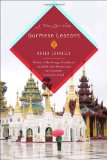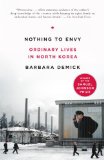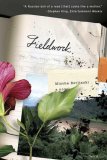Summary | Excerpt | Reviews | Beyond the book | Read-Alikes | Genres & Themes | Author Bio

A True Love Story
by Karen ConnellyWhy do we read? And why do writers like Karen Connelly devote their lives to creating books? Among the reasons I spend precious hours reading, one of the primary is to know myself better. Such discovery is accomplished most often by temporarily becoming part of the lives – fictional or factual – of others. In Burmese Lessons: A True Love Story, Connelly references her own reasons for writing about Burma, Burmese friends and her Burmese lover; but I can not know all of those reasons or their rank. What I can know is that her love story, both for a country and for a man, was a solid fit in my hierarchy of motivations for reading: Connelly's talent for word craft, combined with her passion, brought me, a reader with little knowledge of Burmese culture or history, to the doorstep of the country.
Connelly already had a strong bond with Asia when she traveled to Burma in 1996. Her time in Thailand as a seventeen year-old exchange student initiated her passion for Asia's culture and people groups. She originally traveled to Burma on a mission to interview a specific woman, an imprisoned writer; once she arrived, Burma's political and practical struggles arrested her mind and heart. She was compelled to see more, to immerse herself, trying to come closer to understanding a world far different from her Canadian birthplace or her beloved home in Greece.
As she travelled and made contacts, interviewing as widely as possible, Connelly met a man named Maung. She soon learned that Maung was a leader in the revolutionary group All Burma Students' Democratic Front (ABSDF). But before she knew even this much, his interest in her was irresistible. From their initial meeting at a party to their time spent with ABSDF revolutionaries in border jungle, Connelly and Maung shared an insatiable physical attraction. Trying to differentiate between love and lust became nearly impossible for Connelly as both impulses asserted themselves strongly and with great speed. She continued her research and writing during this love affair, and the uncertainty caused by the relationship exerted strong influence on her work. Connelly's narrative celebrates the pleasures of sex without shyness, but equally emphasizes the other pleasures of the senses in her lush descriptions of landscapes and foods.
The contrast between the couple's desperate lovemaking and the gritty and dangerous plight of the Burmese dissidents is jarring in places; in most instance, however, Connelly's transparency works as a demonstration of her commitment to nearly uncomfortable honesty and as a reflection of the incongruous reality the Burmese dissidents (and those devoted to their cause) face. They have little choice but to blend arduous survival work with the satisfaction, where possible, of their most human desires.
I am complimenting Burmese Lessons when I say that it is a book that is difficult to define. It is a travel narrative of the finest quality. Its pages contain both history and biography. Most of all, it is the memoir of Connelly's fierce love for both a person and place. This book meets my definition of a page-turner. It is literary nonfiction of great substance and beauty.
![]() This review
first ran in the June 9, 2010
issue of BookBrowse Recommends.
This review
first ran in the June 9, 2010
issue of BookBrowse Recommends.

If you liked Burmese Lessons, try these:

by Barbara Demick
Published 2010
A remarkable view into North Korea, as seen through the lives of six ordinary citizens

by Mischa Berlinski
Published 2008
A daring, spellbinding tale of anthropologists, missionaries, demon possession, sexual taboos, murder, and an obsessed young reporter named Mischa Berlinski.
Your guide toexceptional books
BookBrowse seeks out and recommends the best in contemporary fiction and nonfiction—books that not only engage and entertain but also deepen our understanding of ourselves and the world around us.